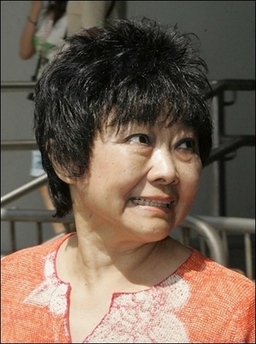Profiles
Asian tycoon 'left fortune to fortune-teller'
(Agencies)
Updated: 2007-04-20 07:08
 |
Large Medium Small |
Asia's richest woman left her wealth to her fortune-teller in her last known will, Hong Kong media reported Thursday.
 Hong Kong tycoon Nina Wang, believed to be the richest woman in Asia, is seen here in 2005. Wang has died at the age of 69, one of her personal secretaries said.[AFP/File]  |
Nina Wang, who died at 69 earlier this month and had no children, left a legacy estimated to be worth at least $4.2 billion after transforming her company Chinachem into a real estate empire.
A day after her lavish funeral on Wednesday, two wills she allegedly wrote in 2002 and 2006 were published by the Hong Kong media.
The 2002 document said Wang's fortune would go to her charitable trust. But the later version named her personal fortune-teller, Chan Chun-chuen, as the beneficiary.
Wang's lawyer Jonathan Midgley declined to comment on the reports.
If true, the 2006 document would have been penned two years after Wang was diagnosed with cancer and after she won an eight-year court battle against her father-in-law for control of her late husband Teddy Wang's estate.
He disappeared in 1990 after being kidnapped. His body was never found, and he was declared dead nine years later.
Wang's 2006 will said Chan would be sole beneficiary of her entire estate and would determine the distribution of her fortune.
The document, in English, showed Chan's identification number and date of birth and also said the 47-year-old would use her estate in a "good and proper way".
Albert Ho, a lawyer who has experience in dealing with inheritance cases, said the later document could easily be challenged in court on the basis that Wang, ill from cancer, may have written it under undue influence.
"The court would have a presumption that she was under undue influence," he told AFP.
"If there's evidence someone who a patient trusts has exploited his or her weakness and ignorance to gain unfair benefits, the court could rule that the will is invalid.
"This is not uncommon and I've done a lot of cases like this."
A two-page will provided by a friend of Wang and supposedly written in Chinese in 2002 named no beneficiary but indicated her assets should go to a charitable trust she set up with Teddy Wang before he vanished.
The document said the Chinachem Charity Trust should be supervised by the United Nations secretary-general, the country's premier and the leader of Hong Kong. It said the board should ensure the foundation expands and endures and that it would set up international scholarship awards similar to the Nobel Prize.